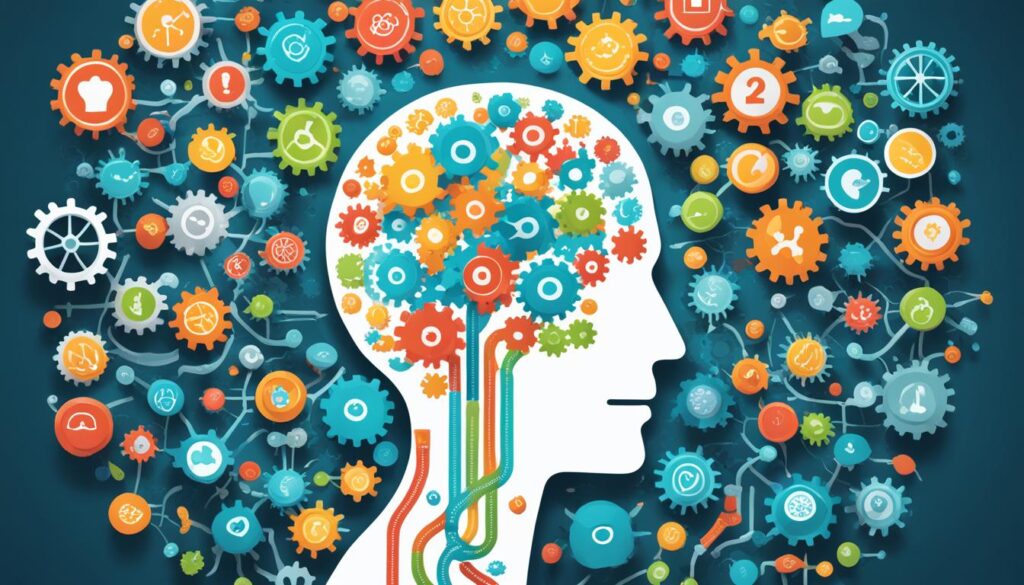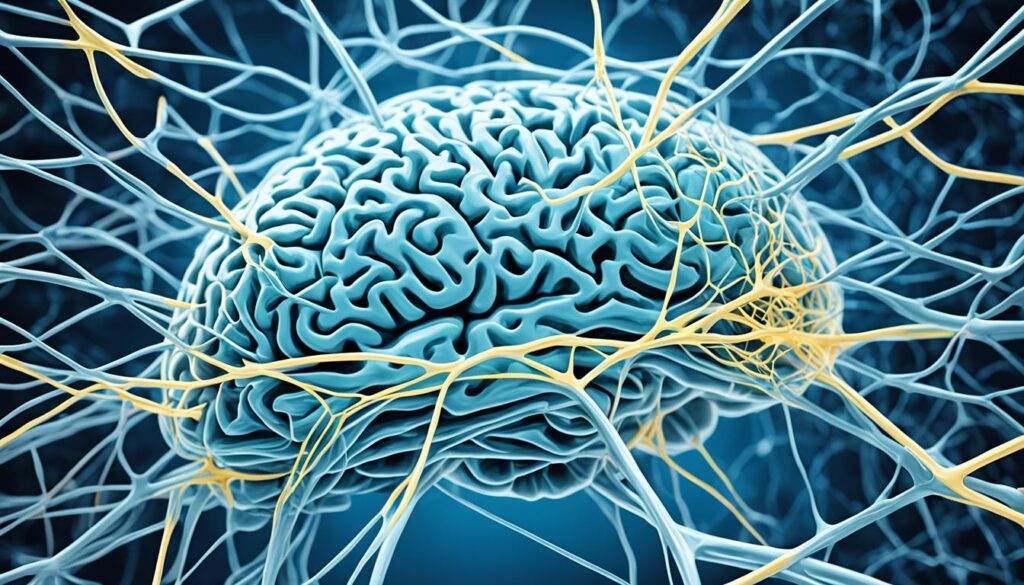Have you ever noticed how some people remember things easily, while others forget important details? Many of us look for ways to improve our memory as we get older. This article will share tips to help you boost your memory. These include staying active, doing mentally challenging tasks, eating well, and managing stress. These methods are backed by science and are easy to follow.
Key Takeaways
- Aim for 150 minutes of moderate aerobic activity or 75 minutes of vigorous activity every week1.
- Adults should strive for 7 to 9 hours of quality sleep nightly to enhance cognitive functions12.
- Engage in social interactions regularly to help prevent memory decline12.
- Maintain a balanced diet rich in fruits, vegetables, and low-fat protein for optimal brain health1.
- Managing chronic health conditions such as high blood pressure and diabetes can contribute to better memory health1.
Understanding Memory and Cognitive Function
Memory and cognitive health are key for our daily lives. They help us process information, remember things, and do tasks well. Genetics, environment, and lifestyle choices affect our cognitive health3. Making small changes in our lives can help keep and boost our memory and thinking skills3.
Memory and Cognitive Health
Managing chronic conditions is important for cognitive health. High blood pressure in midlife can increase the risk of losing cognitive skills and even dementia3. Being active and eating a diet full of fruits, veggies, and lean proteins helps keep our brains sharp3.
Adults over 65 often face mild cognitive impairment (MCI), affecting about 20%4. But, only a small number of these people will get Alzheimer’s in five years4. To fight MCI, activities like learning new things and staying social are key4. Getting 7 to 9 hours of sleep each night also boosts memory5.
The Role of Neuroplasticity
Neuroplasticity lets our brains change by making new connections. Doing mental exercises and learning new skills helps our brains stay sharp5. Meditation and activities like digital photography can even grow gray matter in the brain, improving memory and thinking5.
Keeping a healthy weight is crucial as being overweight can hurt our memory and thinking5. Focusing on mental and physical health through neuroplasticity can improve our cognitive health. It also lowers the risk of age-related brain problems.
Physical Activity and Its Impact on Memory
Regular physical activity is key to better memory and brain health. Doing aerobic exercises helps improve memory and brain function. It also boosts cognitive skills and helps keep memories sharp.
Aerobic Activities for Brain Health
Aerobic exercises are great for the brain. Activities like walking, running, and cycling boost blood flow to the brain. This is vital for keeping the brain working well and adapting.
Studies show that adults who do 150 minutes of moderate exercise a week have better memory and thinking skills6. Also, dog owners walk more each day, which is good for their brains6.
A 2012 study found that exercise helps with thinking skills, showing a big improvement7. A 2013 review also said that exercise makes memory better, with a big effect7.
Exercise and Neuroplasticity
Exercise boosts how the brain changes and adapts, known as neuroplasticity. It helps improve memory and thinking skills. For example, a 2019 review showed exercise helps with remembering past events7.
Long-term exercise also makes thinking better, as many studies have shown7. In 2021, it was found that regular exercise helps middle-aged and older people remember better7. The American Academy of Neurology suggests 150 minutes of moderate exercise and two strength training sessions a week for better memory and brain health8.
Engaging in Mental Stimulation
Mental stimulation is key for improving memory. Doing cognitive challenges regularly can make your brain work better and help you remember new things.
Learning New Skills
Learning new skills is a great way to keep your mind sharp. A 2014 study found that learning a new skill can make memory better in older people9. For example, research showed that brain stimulation helped improve memory in some people10. Playing musical instruments or learning a new language not only keeps your brain active but also helps you remember things better9.
Brain-Boosting Activities
Doing different activities can also boost your brain. Activities like jigsaw puzzles help keep your brain sharp as you age9. Playing card games can also make your brain bigger in some areas and improve your memory and thinking9. The Centers for Disease Prevention and Control say learning new dance moves can make your brain work faster and remember things better9. Plus, exercise is important for your brain health because it brings more nutrients and oxygen to it11.
Doing various mental activities, like reading, solving crosswords, and staying connected with others, helps your brain grow. Learning new things and facing challenges keeps your memory sharp. Studies show that an active brain usually has better memory11.
| Activity | Benefit | Source |
|---|---|---|
| Learning New Language | Improved long-term memory | 109, |
| Playing Instruments | Cognitive stimulation and memory retention | 9 |
| Jigsaw Puzzles | Protective factor for visuospatial cognitive aging | 9 |
| Card Games | Improve memory and thinking skills | 9 |
| New Dance Moves | Increased brain processing speed | 9 |
Maintaining Social Connections
Keeping strong social connections is key for staying mentally sharp and emotionally healthy. Researchers looked at 13 studies from around the world. They found that older adults with more social connections are less likely to have mild cognitive impairment, dementia, or die early12.
About half of people by age 85 suffer from significant memory loss, and a quarter have dementia that affects their daily life13. But, those with more social ties tend to live longer and enjoy life more13.
Being active in social circles can really boost your memory. For example, meeting with family or friends often can lower the risk of dementia12. Helping out or joining community groups also brings social benefits by cutting down the risk of death12.
Older adults often have fewer close friends and family than younger people, leading to a quieter life13. Yet, staying connected can help counteract aging’s negative effects. Studies at Ohio State University found that mice living together had better memories and less brain inflammation than those living alone14. This suggests that being part of a group can greatly benefit emotional and mental health.
Having strong social connections is good for your emotional health and brain health too. The amygdala, a key brain area, works better with regular social interaction13. Younger people have more dopamine receptors, showing older adults need to stay socially active to keep their brains sharp13.
- People with strong social ties live longer and healthier13.
- Being social often lowers dementia risk and boosts memory12.
- Older adults can fight mental decline by staying socially active13.
| Factor | Impact on Older Adults |
|---|---|
| Frequent Social Interactions | Lower dementia risk and better emotional health12 |
| Living with Others | Less chance of dying and sharper mental skills12 |
| Community Activities | Boosts emotional health and memory12 |
| Group Housing (based on mouse studies) | Improved memory and less inflammation14 |
Organizational Strategies to Aid Memory
Using organizational tools every day can really help improve your memory and make things clearer in your mind. By making tasks simpler and cutting down on mental clutter, you can focus better and remember important stuff more easily.
Using a Planner or Calendar
Keeping a planner or calendar is a smart move to boost your memory. Tools like Google Calendar, Evernote, and Remember the Milk help organize tasks, notes, and reminders well. This makes you more productive and sharp15. Writing things down by hand is better for learning than typing, so a physical planner is a great tool16. Visual aids like charts and graphs make information easier to understand and remember16.
Creating a Clutter-Free Environment
Getting rid of clutter helps clear your mind. A tidy space means fewer distractions and a sharper focus. Using file cabinets, sticky notes, and specific spots for important items helps manage your tasks better15. Cleaning your space as you go helps you work faster, like when doing taxes15. A neat workspace also reduces mental stress, making it easier to improve your memory.
Importance of Quality Sleep
Getting good sleep is key to improving memory and brain function. Factors like a regular sleep schedule and a calm bedroom help sleep quality.
Memory Consolidation During Sleep
Sleep quality greatly affects memory. Sleep issues like insomnia or narcolepsy can hurt memory17. Poor sleep messes with the mix of different sleep stages18. People with depression and sleep apnea may also find it hard to keep memories sharp17. Knowing this helps make better sleep tips.
Tips for Better Sleep
Good sleep boosts brain function and fights age-related memory loss18. Here are some tips for better sleep:
- Maintain a Consistent Sleep Schedule: Try to sleep and wake up at the same time every day, even on weekends.
- Create a Restful Environment: Make your bedroom dark, quiet, and cool for better sleep.
- Avoid Stimulants: Cut down on caffeine and nicotine in the evening.
- Screen-Free Time Before Bed: Don’t use screens for an hour before bed to relax.
- Engage in Relaxing Activities: Reading, meditating, or a warm bath can help you sleep better.
Research shows that enough sleep helps fight cognitive decline and dementia18. This highlights the need for sleep tips suited to your lifestyle and age. Adults should aim for 7 to 9 hours of sleep each night for brain health17.
Age affects how much sleep we need, from 7 hours for adults to 12-16 hours for babies17. Knowing these needs helps support brain function and memory across life.
Good sleep is key to mental health, affecting memory and overall well-being. Making sleep a priority is a top way to support brain health over time.
Following a Healthy Diet
Eating right is key to keeping your brain sharp and boosting your memory. A diet rich in fruits, like berries and grapes, is great for your brain health. These fruits are full of antioxidants that fight off brain damage and help prevent memory loss19. Watermelon is also a top choice, thanks to its lycopene and antioxidants, which support brain health19.
Adding avocados to your meals can also help your memory. They’re packed with monounsaturated fats that improve your blood cholesterol levels19. Beets and dark leafy greens are also good for your brain. They boost blood flow to the brain and fight age-related memory loss19.
Fatty fish like salmon and mackerel are great for your brain. They’re full of omega-3 fatty acids that slow down mental decline and may prevent Alzheimer’s disease20. Eating fish one to two times a week can increase gray matter in your brain. This gray matter is important for making decisions, remembering things, and feeling emotions1920.
Nuts and olive oil are also key for brain health. They provide monounsaturated fats and omega-3s, which are good for your blood vessels19. Eating nuts regularly can lower the risk of cognitive decline in older people. This is thanks to their vitamin E, healthy fats, and antioxidants20.
Herbs and seeds like cocoa seeds, rosemary, mint, sesame seeds, and saffron are also good for your memory and brain health19. Foods like broccoli, full of vitamin K and sulforaphane, can improve memory and brain function in older adults20.
A big study with 27,860 men and women across 40 countries found that the healthiest diets led to less cognitive decline21. The best diets included lots of fruits, vegetables, nuts, and fish. They also had moderate alcohol use and less red meat. This diet was best for boosting memory and brain function21.
In short, eating right can greatly improve your memory and brain health. Try to eat a mix of nutrient-rich foods every day for the best results.
Memory Boost Supplements
Many people look for ways to improve their memory and brain function. About 25% of adults over 50 use supplements to help keep their brains healthy22. It’s crucial to talk to a healthcare professional before starting any new supplements.
Research on supplements shows mixed results. Some studies suggest vitamin B might help, but the evidence is not clear22. Large studies haven’t found omega-3 supplements to lower the risk of dementia22.
A 2017 review found that omega-3 supplements might help people with a gene linked to Alzheimer’s22. But, ginkgo and ginseng don’t seem to improve mental skills22. Taking too many supplements can cause side effects and interact with other medicines22.
Vitamin E might slow down Alzheimer’s in some people22. Turmeric’s curcumin has helped with memory tests and reduced brain proteins in small studies22.
Recent studies show that ashwagandha, choline, and curcumin can improve memory23. But, a healthy lifestyle is key for brain health. This includes exercise, a supportive network, and a balanced diet23.
There are ways to save money on supplements too. Using the code FREEDOM can give up to 25% off, depending on what you buy24. Watching for deals can help make supplements more affordable.
It’s important to be careful with supplements because the results and risks vary. Stick to ingredients proven to work by credible research. Always talk to a healthcare provider to find the best supplements for you.
Managing Stress for Better Cognitive Function
Stress and cognitive function are closely linked. Chronic stress can harm memory and thinking skills. It’s vital to manage stress well to keep your brain sharp.
Stress-Reduction Techniques
There are many ways to lessen stress’s bad effects. Meditation can clear your mind and lower anxiety, helping you remember things better. Exercise is great for your brain and thinking skills. Taking breaks and enjoying free time is also key to reducing stress.
Doing things like puzzles, learning a new language, or playing music can lower stress and boost brain health25. Getting help from doctors or therapists can also help you find the best ways to manage stress25.
The Impact of Stress on Memory
High stress levels can make it harder to think well, increasing the risk of poor thinking skills26. Signs of chronic stress include feeling foggy, making poor decisions, and struggling with tasks25. Managing stress is key to keeping your brain working well and protecting your memory from stress damage.
When stress hits at the right time, it can affect how well you remember things. Stress before or during learning can make it harder to remember. But stress after learning might help you remember better27. Long-term stress can also hurt your thinking skills, causing memory issues that last even after the stress is gone27.
| Stress Indicators | Impact on Cognitive Function |
|---|---|
| Elevated Stress Levels | 37% higher odds of poor cognition26 |
| Chronic Stress | Increased risk of neurological conditions25 |
| Stress Timing | Pre/post-encoding affects memory differently27 |
| Stress-related Exhaustion | Cognitive impairment can persist for up to three years27 |
Practicing mindfulness, like deep breathing and imagining, can help stressed people remember better27. Exercise also boosts memory in those who are stressed27. These methods show how important it is to manage stress for a healthy brain and memory.
Conclusion
Improving memory and brain function needs a mix of activities. Physical exercises like running help keep the brain healthy and flexible, which is good for memory. London’s taxi drivers, who learn a lot, have bigger hippocampi, which is important for memory28.
Cognitive training boosts memory, attention, and hearing skills, with lasting effects28. Reading books regularly can also make your working memory 15% better than playing word games29.
Good sleep is key for a healthy brain. People who sleep 7-8 hours a night do 20% better in memory tests than those who sleep less29. Sleeping well, like with a sleep mask, can make memory 20% better29.
Managing stress is also vital. Too much stress can shrink the hippocampus by 14%, hurting memory28. Remembering happy times can lower stress and help control emotions30.
Learning new things and using techniques like the Five x Five System can improve memory28. Being active and connected with others is good for the brain. Retirees who volunteer stay mentally sharp 30% longer than those who don’t29.
By following these strategies, we can greatly improve our memory and brain health. This keeps our minds sharp as we age.
FAQ
How can physical activity improve my memory?
What does neuroplasticity mean for my cognitive function?
Why is social interaction important for memory enhancement?
How can I use organizational strategies to aid my memory?
What are the benefits of quality sleep for memory improvement?
How does a healthy diet contribute to better cognitive function?
Are memory boost supplements effective?
What techniques can I use to manage stress for better cognitive function?
Source Links
- Memory loss: 7 tips to improve your memory – https://www.mayoclinic.org/healthy-lifestyle/healthy-aging/in-depth/memory-loss/art-20046518
- How to Improve Your Memory – HelpGuide.org – https://www.helpguide.org/articles/healthy-living/how-to-improve-your-memory.htm
- Cognitive Health and Older Adults – https://www.nia.nih.gov/health/brain-health/cognitive-health-and-older-adults
- Memory – Harvard Health – https://www.health.harvard.edu/topics/memory
- 14 Natural Ways to Improve Your Memory – https://www.healthline.com/nutrition/ways-to-improve-memory
- Physical Activity Boosts Brain Health – https://www.cdc.gov/physical-activity/features/boost-brain-health.html
- Acute and Chronic Exercise Effects on Human Memory: What We Know and Where to Go from Here – https://www.ncbi.nlm.nih.gov/pmc/articles/PMC8584999/
- How Exercise Can Help Boost Your Memory – https://health.clevelandclinic.org/exercise-to-boost-memory
- Brain Exercises: 13 Ways to Boost Memory, Focus, and Mental Skills – https://www.healthline.com/health/mental-health/brain-exercises
- Brain stimulation can affect memory in older adults – https://www.nih.gov/news-events/nih-research-matters/brain-stimulation-can-affect-memory-older-adults
- Staying mentally active – https://www.nidirect.gov.uk/articles/staying-mentally-active
- Social Connections Combat Dementia and Prolong Lifespan – Neuroscience News – https://neurosciencenews.com/social-connections-longevity-dementia-23142/
- Social Engagement and Cognition – When I’m 64 – https://www.ncbi.nlm.nih.gov/books/NBK83766/
- Research confirms that social interaction protects memory – https://www.medicalnewstoday.com/articles/321976
- Organize for Better Thinking and Memory – https://www.psychologytoday.com/us/blog/memory-medic/201604/organize-better-thinking-and-memory
- Science-Backed Memory Tips and Recall Techniques | USAHS – https://www.usa.edu/blog/science-backed-memory-tips/
- How Memory and Sleep Are Connected – https://www.sleepfoundation.org/how-sleep-works/memory-and-sleep
- How Lack of Sleep Impacts Cognitive Performance and Focus – https://www.sleepfoundation.org/sleep-deprivation/lack-of-sleep-and-cognitive-impairment
- Nutrient-rich diet to maximize memory – https://www.mayoclinichealthsystem.org/hometown-health/speaking-of-health/maximize-memory-function-with-a-nutrient-rich-diet
- 11 Best Foods to Boost Your Brain and Memory – https://www.healthline.com/nutrition/11-brain-foods
- Healthy diet may improve memory, says study | CNN – https://www.cnn.com/2015/05/06/health/healthy-eating-preserves-memory-study/index.html
- Brain Supplements: What Works, What Doesn’t – https://www.webmd.com/brain/ss/slideshow-brain-supplements
- Can Vitamins Boost Memory? – https://www.healthline.com/health/dementia/vitamins-memory-loss
- Brain & Memory Power Boost – https://brainmd.com/brain-memory-power-boost
- The Effect of Stress on the Brain and Ways to Manage it | Nuvance Health – https://www.nuvancehealth.org/health-tips-and-news/the-effect-of-stress-on-the-brain-and-ways-to-manage-it
- Too Much Stress May Lead to Cognitive Decline – https://www.everydayhealth.com/stress/managing-stress-could-keep-your-mind-sharp/
- How You Can Improve Your Memory When Dealing With Stress – https://www.verywellmind.com/stress-and-your-memory-4158323
- Memory improvement – https://en.wikipedia.org/wiki/Memory_improvement
- Do you need a Memory Boost? – https://www.linkedin.com/pulse/do-you-need-memory-boost-tony-christodoulou-pogde
- Reminiscing about positive memories buffers acute stress responses – https://www.ncbi.nlm.nih.gov/pmc/articles/PMC6719713/






